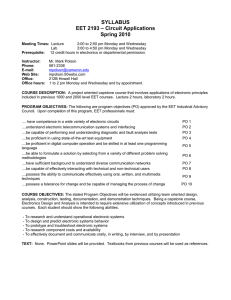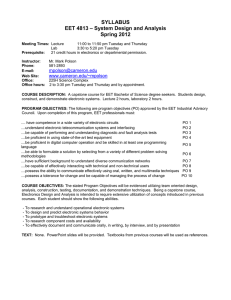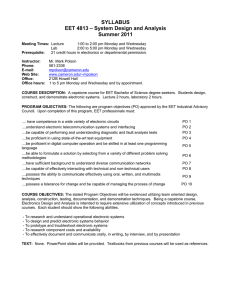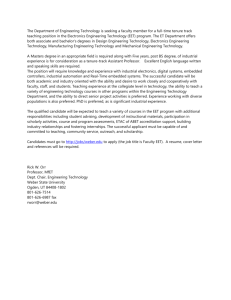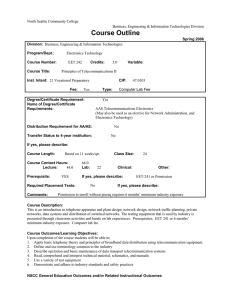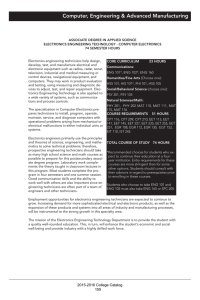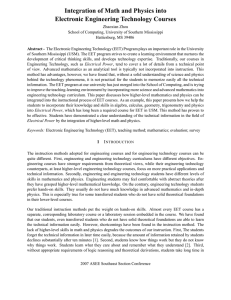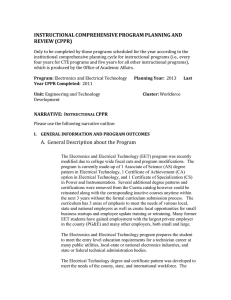SYLLABUS – Circuit Applications EET 2193 Spring 2013
advertisement
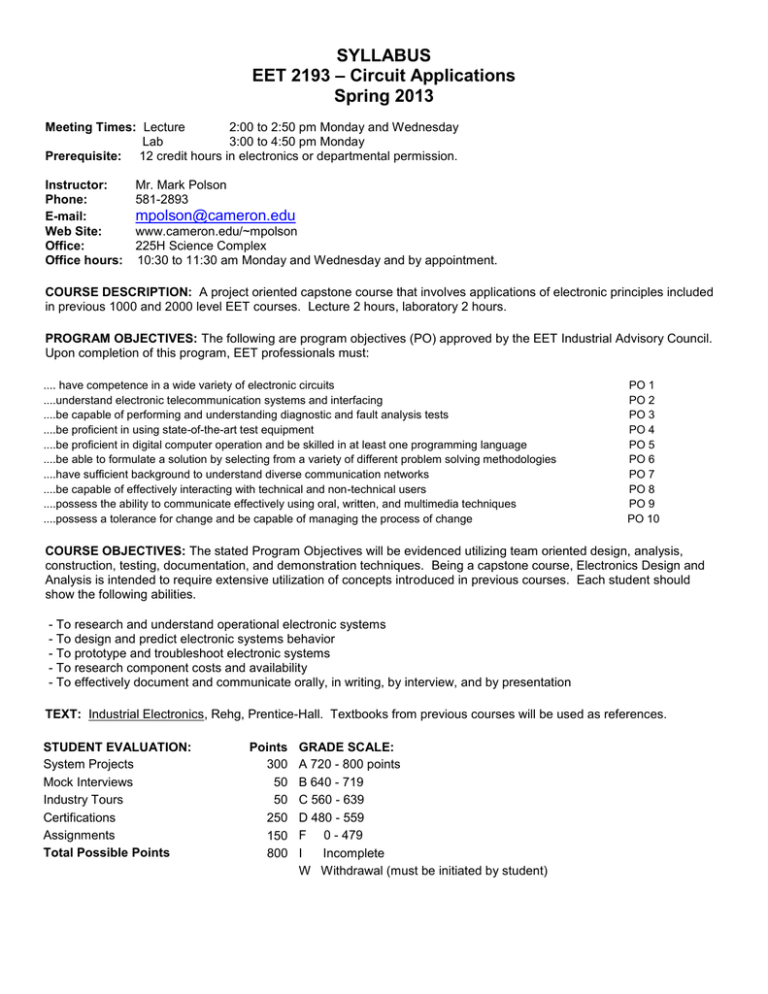
SYLLABUS EET 2193 – Circuit Applications Spring 2013 Meeting Times: Lecture 2:00 to 2:50 pm Monday and Wednesday Lab 3:00 to 4:50 pm Monday Prerequisite: 12 credit hours in electronics or departmental permission. Instructor: Phone: E-mail: Web Site: Office: Office hours: Mr. Mark Polson 581-2893 mpolson@cameron.edu www.cameron.edu/~mpolson 225H Science Complex 10:30 to 11:30 am Monday and Wednesday and by appointment. COURSE DESCRIPTION: A project oriented capstone course that involves applications of electronic principles included in previous 1000 and 2000 level EET courses. Lecture 2 hours, laboratory 2 hours. PROGRAM OBJECTIVES: The following are program objectives (PO) approved by the EET Industrial Advisory Council. Upon completion of this program, EET professionals must: .... have competence in a wide variety of electronic circuits ....understand electronic telecommunication systems and interfacing ....be capable of performing and understanding diagnostic and fault analysis tests ....be proficient in using state-of-the-art test equipment ....be proficient in digital computer operation and be skilled in at least one programming language ....be able to formulate a solution by selecting from a variety of different problem solving methodologies ....have sufficient background to understand diverse communication networks ....be capable of effectively interacting with technical and non-technical users ....possess the ability to communicate effectively using oral, written, and multimedia techniques ....possess a tolerance for change and be capable of managing the process of change PO 1 PO 2 PO 3 PO 4 PO 5 PO 6 PO 7 PO 8 PO 9 PO 10 COURSE OBJECTIVES: The stated Program Objectives will be evidenced utilizing team oriented design, analysis, construction, testing, documentation, and demonstration techniques. Being a capstone course, Electronics Design and Analysis is intended to require extensive utilization of concepts introduced in previous courses. Each student should show the following abilities. - To research and understand operational electronic systems - To design and predict electronic systems behavior - To prototype and troubleshoot electronic systems - To research component costs and availability - To effectively document and communicate orally, in writing, by interview, and by presentation TEXT: Industrial Electronics, Rehg, Prentice-Hall. Textbooks from previous courses will be used as references. STUDENT EVALUATION: System Projects Mock Interviews Industry Tours Certifications Assignments Total Possible Points Points 300 50 50 250 150 800 GRADE SCALE: A 720 - 800 points B 640 - 719 C 560 - 639 D 480 - 559 F 0 - 479 I Incomplete W Withdrawal (must be initiated by student) System Projects: Several electronic system projects will be performed during the semester. An engineering notebook will be kept documenting the design process. Projects will be taken from the design stage to the implementation stage. Mock Interviews: Students will be required to do a mock interview during the Industrial Advisory Committee meeting. Students will be required to prepare a resume documenting their current qualifications. Industry Tours: Tours of different industry sites will be performed during the semester. Students will be required to write a memo documenting their experience. Certifications: Several certification labs and quizzes will be performed during the semester. Students will be required to perform certain experiments demonstrating their competency in different electronic areas. The final exam will be the Certified Electronics Technician certification assessment. Assignments: Several assignments will be given to assess the students comprehension of the subject matter. Schedule: The first 11 chapters will be covered in the text. The first several chapters are review of previous courses and will be covered in the first several weeks. Approximately two weeks will be allocated to each of the following chapters. Week 1 2 3 4 5 6 7 8 9 10 11 12 13 14 15 16 Chapter 1 2 3 4 5 5 6 6 7 8 9 9 10 10 11 11 Description Overview Switches/Actuators Solid State Electronics Op Amps Thyristors Sensors Process Control Safety DC Motors AC Motors Other Motors University Policy: Cameron University discourages lecture and/or laboratory attendance by any person not enrolled in the course. Included are student’s friends, student’s spouses, and student’s children. Tobacco product use is not allowed in any building on Cameron University campus. Accommodations of Disabilities: It is the policy of Cameron University to accommodate students with disabilities, pursuant to federal and state law. Students with disabilities who need classroom accommodations must make their requests by contacting the Office of Student Development at (580) 581-2209, North Shepler, Room 314. Academic Honesty: Each student is expected to engage in all academic pursuits in a manner that is above reproach. Students are expected to maintain complete honesty and integrity in the academic experiences both in and out of the classroom. Any student found guilty of academic dishonesty will be subject to disciplinary action.
